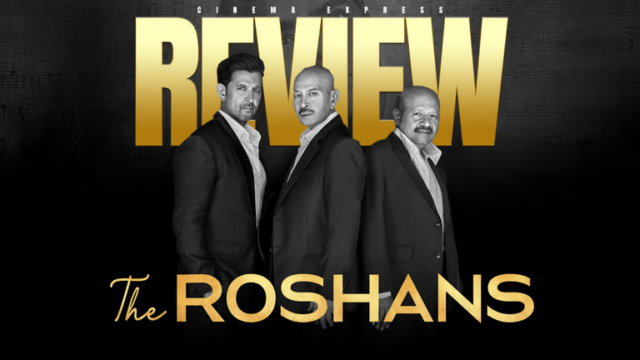With more highs than lows of the individuals and a storytelling flaw it never compensates for, The Roshans gets perilously close to becoming a mere vanity project
The Roshans(2 / 5)
The Netflix documentary The Roshans resembles an underwhelmingly written and edited draft of a long manuscript. It does not have any punctuation, leaving the audience’s imagination little room to breathe. It tells and shows you everything, often more than necessary. Take the moment where Rakesh Roshan talks about his struggles as an actor, for instance. We already know that Rakesh is a successful director, without any flops in his filmography. When Rakesh himself talks about his desire to become a director after failures in acting and production, it is obvious that the failures would precipitate his success. But then his son Hrithik Roshan reiterates this point with the most basic line, “Through those failures, he became what he was truly meant to be.”
Streamer: Netflix
Subjects: Roshan, Rakesh Roshan, Rajesh Roshan, Hrithik Roshan
The Roshans, despite its noble intentions, suffers from a repetitive structure that makes it feel longer than it is. In the documentary, speakers often reiterate an idea about the family’s creative prowess or long legacy. For instance, one speaker emphasises one of the Roshans’ brilliance, only for another to immediately echo the sentiment, seemingly intent on overstating their genius. The platitude with which most of the speakers describe the Roshans makes the documentary rather uninteresting, notwithstanding the sheer passion that has gone into every single moment here. In one moment, Rajesh Roshan is described as a ‘very creative person’. The moment comes midway through the section devoted to Rajesh. Of course, he is a music director with a diverse body of work and many successful collaborations. What else could he possibly be, given his profession? In another moment, someone describes Hrithik Roshan as a ‘Greek God’. It then leads to an entire section that simply gloats over Hrithik’s skills as a dancer. It does not take much for us to wonder what is the point of stating the obvious. It feels almost like cricket commentary.
Even when the documentary tries to explore a seemingly interesting facet about one of the Roshans, it does not pique our curiosity enough because we already know it. For example, the portion about Hrithik acting as a young boy in a scene with Rajinikanth or a gangster attack on Rakesh Roshan. It does not take much online research to get these facts.
Speaking of which, the commitment to factual accuracy should not limit a documentary’s ability to be captivating, insightful, and impactful. It is possible to weave a compelling narrative with real-life events even in non-fiction documentary filmmaking. You can provide a comprehensive understanding of the subject matter with expert testimony, archival footage, and interviews. In short, the greatness of a non-fiction documentary lies in its ability to inform, inspire, and even challenge conventions with unique storytelling and other means. The Roshans does only one thing effectively: inform. You start watching it knowing that the Roshans are an immensely talented bunch, and you walk away knowing little else. Thankfully, it stops short of being a vanity project because there is much truth in what it has to say and plenty of honesty.
The first and second episodes about music director Roshan and his son Rajesh stand out more for how they take us to the creative process of these two composers. At least each of the episodes informs you about the sheer range and versatility of the respective talents. It is a clever touch to introduce one of their songs and then show us a corresponding visual of the track from the film. This way, you are not always listening to a monologue. The part where Javed Akhtar says that Rajesh never understood the true level of his skill is one of the few moments that resonate for the pith in it and the sheer lack of platitude in it. And the part where the Roshan brothers, Rajesh and Rakesh, decide to become creative people soon after their father’s passing is poignant because it does not stay too long in the moment or over-emphasise it. You can say the same about Hrithik turning on the radio and listening to his grandfather speak for the first time. What an irony! The man has listened to his grandfather’s music for years but has never heard his voice before! The Roshans effectively crafts an image of a dynasty celebrating itself for posterity. However, it remains questionable whether the celebration resonates beyond the confines of the Roshan family and their immediate circle.
News Credits: cinema Express










